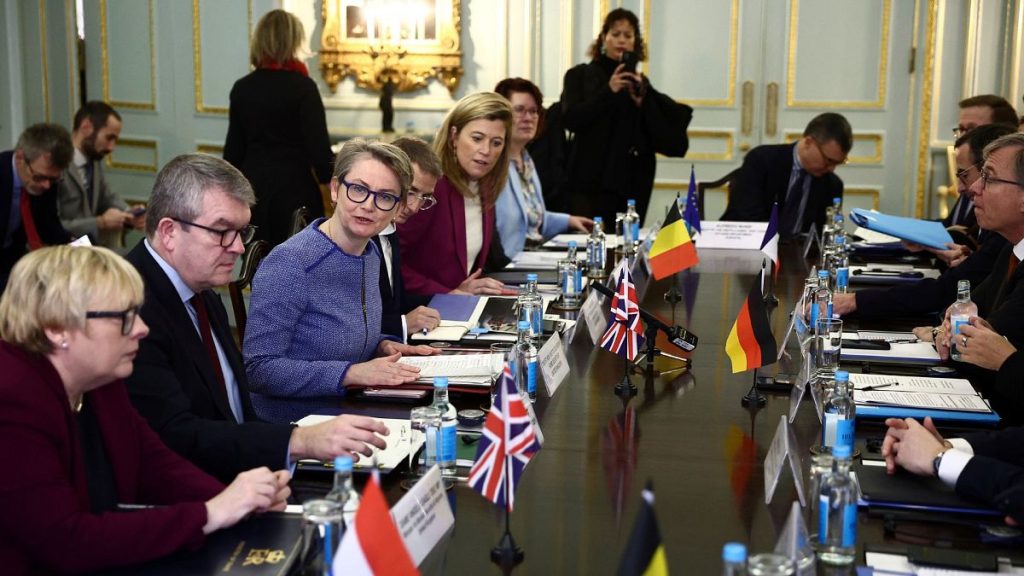The United Kingdom and Germany have forged a significant partnership aimed at dismantling the criminal networks facilitating the perilous small boat crossings of migrants across the English Channel. This joint action plan, signed by UK Home Secretary Yvette Cooper and German Interior Minister Nancy Faeser, represents a crucial step in bolstering international cooperation against human smuggling. The agreement emphasizes enhanced intelligence sharing and cross-border law enforcement collaboration, targeting the financial infrastructure underpinning these illicit operations. Germany, a key transit point for materials used in these crossings, will criminalize the act of facilitating migrant smuggling to the UK, signaling a strong commitment to disrupting the logistical supply chain. This collaborative approach recognizes that these criminal enterprises operate across international borders, necessitating a unified and coordinated response.
The core elements of the action plan encompass a multi-pronged strategy. Information sharing between UK and German security agencies will be intensified, enabling a more comprehensive understanding of the smuggling networks’ operations, personnel, and financial flows. A critical focus will be on disrupting the financial mechanisms that sustain these criminal activities, depriving smugglers of their ill-gotten gains and hindering their ability to operate. The agreement also extends to combating the online presence of smuggling groups, targeting their use of social media platforms to advertise their services and recruit vulnerable individuals. By removing this harmful content, the plan aims to limit the reach and influence of these criminal organizations.
This bilateral agreement is particularly noteworthy given its timing and context. It precedes a meeting of the “Calais Group,” a broader international forum comprising the UK, Germany, Belgium, France, and the Netherlands, along with Europol and Frontex – agencies dedicated to law enforcement and border security within the European Union. This suggests that the UK-Germany partnership may serve as a catalyst for broader regional cooperation in tackling the Channel crossings challenge. The agreement also represents a crucial step in rebuilding the UK’s law enforcement ties with European neighbors following its exit from the European Union, which complicated existing frameworks for information sharing and cross-border operations.
The persistent flow of migrants across the English Channel underscores the complex and enduring nature of this challenge. Despite ongoing efforts by the UK and France to stem the tide, the Channel remains a primary route for individuals fleeing conflict, persecution, or economic hardship. The perceived advantages of the UK, including language familiarity, existing family ties, and the hope for greater asylum and employment opportunities, continue to draw migrants, despite the inherent dangers of the journey. The perilous nature of these crossings, often undertaken in overcrowded and unsuitable vessels, has resulted in a tragic loss of life, with 2024 already marking the deadliest year since the surge in crossings began in 2018.
The drivers behind these migration patterns are deeply rooted in global inequalities and instability. Conflict and persecution in source countries compel individuals to seek refuge elsewhere, while economic disparities and lack of opportunity fuel the desire for a better life. These push factors, combined with the perceived pull factors of the UK, create a powerful dynamic that sustains the demand for smugglers’ services. Addressing this complex issue requires a comprehensive approach that encompasses not only border security measures but also efforts to address the root causes of migration and provide safe and legal pathways for those seeking refuge.
The UK-Germany partnership signifies a renewed commitment to addressing the migrant crisis through enhanced cooperation and targeted strategies. While border security remains paramount, the emphasis on intelligence sharing, financial disruption, and online content removal reflects a broader understanding of the complexities driving these dangerous journeys. The agreement’s success will depend on effective implementation, sustained commitment from both nations, and continued collaboration with other European partners. Ultimately, a long-term solution will require a comprehensive international effort to address the root causes of migration and create a more just and equitable world.

